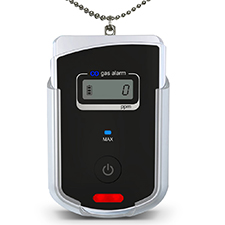Safe travels with a Carbon Monoxide Detector
If you’re here reading this, you’re probably already aware of a number of high profile carbon monoxide poisoning deaths at hotels and Airbnbs. It seems like there’s a tragic news story every month covering deaths from carbon monoxide poisoning. They’re often–but not always–in international destinations. Because carbon monoxide (CO) can be released by malfunctioning equipment like furnaces and swimming pool heaters, hotels in the US aren’t necessarily any safer if they don’t have CO detectors in every room.
Carbon monoxide is a colorless and odorless gas, meaning that a detector is necessary to be alerted to CO buildup. It’s scarily easy to fall victim to carbon monoxide poisoning, but also easy to protect yourself.
While some Airbnbs and many hotels do have carbon monoxide detectors, not all do. Smoke detectors are more common, and they DO NOT detect CO (this is important to take note of at home too!). I strongly recommend buying a detector for your travels. They’re easily packable and available in a wide budget range.
Here’s GZAIR carbon monoxide detectors to consider when traveling.

portable carbon monoxide detector
This small, handheld detector is extremely sensitive, alarming faster, and at lower CO concentrations than other sensors. It small enough to toss in a purse, so even when traveling carry-on only, I don’t feel tempted to leave it at home.
I love the clear screen showing battery level and CO level. When triggered, the bright red LED light turns on, and a 70 decibel buzzer sounds. The easy to use design makes it my top pick– and this is the detector that I carry when I travel.
FAQS
What is Carbon Monoxide? How does it build up in a hotel room or Airbnb and poison travelers?
Carbon Monoxide is a colorless, odorless and tasteless gas that often comes from improperly installed or maintained gas burning devices. Many buildings use gas for heating and cooking. However, CO can also build up from the burning of wood, oil or gasoline.
CO kills by inhibiting the blood’s ability to carry oxygen. Symptoms of CO poisoning include headache, nausea, drowsiness, and confusion. However, many people who die of carbon monoxide poisoning, die in their sleep, without the opportunity to recognize the symptoms and escape. This is why having a CO detector is so important, especially when you travel, and have less knowledge of and control over safety measures taken in your lodging!
I’m staying in a large Airbnb. Do I need more than one Carbon Monoxide Detector?
The EPA recommends that alarms should be installed on each level of a house, at least 5 feet above the floor. You can place an alarm in each bedroom, but if that’s not feasible, the alarm should be placed in the hallway as close as possible to the sleeping areas.
One CO detector should be fine for most hotel rooms, but if you’re traveling with a large party and staying in separate rooms, ensure that each room has their own detector.
What should I do if my carbon monoxide alarm goes off in my hotel or vacation rental?
You should leave the hotel room or Airbnb immediately. Even if you’re not experiencing any symptoms of CO poisoning, it’s better to err on the side of safety.
When staying at a hotel, go to the lobby and insist that they call the fire department or appropriate local agency to have the room checked. If you feel fuzzy headed or otherwise ill, request that the hotel summon medical assistance, and go outside for fresh air.
If staying at a vacation rental, leave the apartment or house immediately. Don’t just leave the room in which the alarm went off, go outside the building into fresh air. Call the fire department yourself to have the home checked, and request medical assistance if you feel ill. Airbnb and other rental platforms do want to know as soon as possible if you experience any problems, so give a call them when you’re able to, and give the host a heads-up about the issue as well.

Leave A Comment